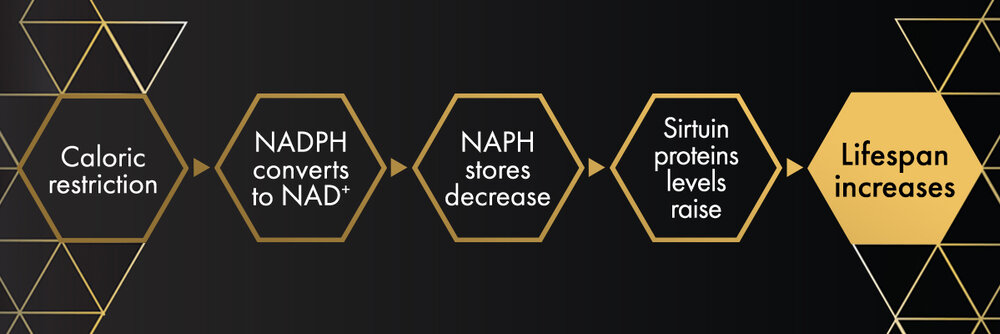5 Natural Ways to Boost NAD+
Nicotinamide Adenine Dinucleotide or NAD+ is central to many metabolic functions in your body. It improves energy production, repairs your cells, boosts metabolism, and offers many health benefits. However, its levels decrease with age.
There are ways to boost NAD+ naturally to preserve your youthful cells and protect against chronic diseases.
Your body produces NAD+ through metabolic pathways, which involves converting bioactive molecules in the body to NAD+ through enzymatic machinery.
The principle behind increasing NAD+ levels naturally is to employ strategies that accelerate this production.
Fortunately, science has explored the potential of different factors that can alter NAD+ production in your body.
So, we have come up with five top methods backed by evidence that answer how to naturally increase your NAD+ levels naturally.
You must have heard the mantra that portion control is a key to longevity and health. This popularity is not unwarranted because science also supports this notion. The experiments on animals show that reducing calories up to 25% to 60% increases lifespan significantly.
Wondering why?
It’s because caloric restriction is one of the most effective methods to increase NAD+ levels naturally. When you fast or consume fewer calories, your body meets its energy demand by triggering a “salvage pathway”.
In this pathway, NADPH in your body loses its hydrogen through a series of chemicals reaction known as oxidative phosphorylation. This term is just a fancy name for a procss that produces energy in your body.
However, the loss of ions in NADPH converts this molecule into NAD+ and replenishes its stores in the body.
Low levels of NADPH also boost sirtuin proteins in the body because these two are competitors. So, when NADPH decreases in quantity, sirtuin proteins get a higher opportunity to exert their impact. Since they are also responsible for longevity in humans, caloric restriction appears to have a double effect.

The influence of nutrition on NAD+ synthesis has two aspects.
Dietary elements
Dietary constituents rich in tryptophan and niacinamide are excellent sources of NAD++ production. Tryptophan is an amino acid, while niacinamide is vitamin B3, a member of the B complex family. Both these serve as precursors for the production of NAD+ in your body.
The foods abundant in these are:
- Meat
- Fish
- Dairy Products
New research studies have also identified intermediates of NAD+ production in the body, in plant and animal foods. For instance, some vegetables contain nicotinamide mononucleotide (NMN), which plays a vital role in increasing NAD+ production naturally.
Such vegetables are:
- Broccoli
- Tomato
- Avocado
- Cabbage
- Cucumber
- Immature soybeans
Apart from this, you can take supplements that contain NAD+ or its precursors because they provide you with raw material for NAD+ availability in the body.
Eating patterns
The NAD+ availability in the body also depends on the type and quantity of food and the timing of the meal. For example, a high sugar and caloric diet creates sugar overload and has high levels of NADPH to spare after the energy production. Therefore, it decreases the availability of NAD+ in the body.
In contrast, intermittent fasting promotes caloric restriction, produces more energy, and increases the levels of NAD+ in the body. Research published in the Journal of Molecular and Cellular Biochemistry shows also confirms the role of intermittent fasting in boosting NAD+ levels.
Therefore, eating habits play a crucial role, and small but frequent meals or intermittent fasting proves favorable.
When you indulge in physical activity, you push NADPH into the salvage pathway and boost NAD+ stores.
Aerobic exercises such as cycling, swimming, and running also stimulate a particular enzyme in skeletal muscles. This enzyme is responsible for reducing the destruction of NAD+ due to aging. So, its stimulation due to physical activity inhibits NAD+ destruction.
In short, exercise delays the impact of aging on NAD+ and boosts your stores naturally.
Your NAD+ levels are bound to your “internal clock”. So, yes, it not only depends on the feeding time but also your sleeping schedule.
A circadian rhythm sets your internal biological clock, which is located in the hypothalamus of your brain. Interestingly, it has a bidirectional relationship with NAD+. Therefore, it not only regulates the sleep-wake cycle but also fluctuates in quantity during sleeping.
In simple words, NAD+ regulates your sleeping patterns. Ever wondered why sleep quality decreases with aging? It is because NAD+ levels decline.
However, the research now proves that restorative sleep and a healthy sleep cycle are also critical to high NAD+ levels in the body. It is because sleep regulates the activity of enzymes that participate in NAD+ synthesis.
So, maintaining a bedtime and regulating your sleep-wakeful cycle helps you increase your NAD+ levels naturally.
Weather and environmental stressors have a strong influence on your NAD+ levels.
Some studies suggest that heat or cold exposure, such as in saunas, has a protective effect on NAD+ levels. It is potentially due to NAD+ synthesizing enzyme being high in response to heat or cold exposure.
Cold stress also stimulates your brown adipose tissue layer- an insulating fat layer beneath your skin. Unlike your usual fat layer, the brown adipose layer burns energy instead of storing it. Consequently, the increase in energy production boosts the conversion of NADPH to NAD+.
One important thing to be mindful of is exposure to the sun. While heat shock therapy can boost NAD+ levels, the excessive sun can prove counterproductive. This is because UV radiations from the sun can damage your cells, and your NAD+ stores can deplete to repair those cells.
Therefore, it is vital to stay mindful of your surroundings and the temperature you expose your body to.
NAD+ production in your body depends on multiple dietary and lifestyle factors. So, it presents an opportunity to increase NAD+ levels in the body naturally. Incorporating these small changes can help you delay aging and reap maximum benefits from high NAD+ levels.


